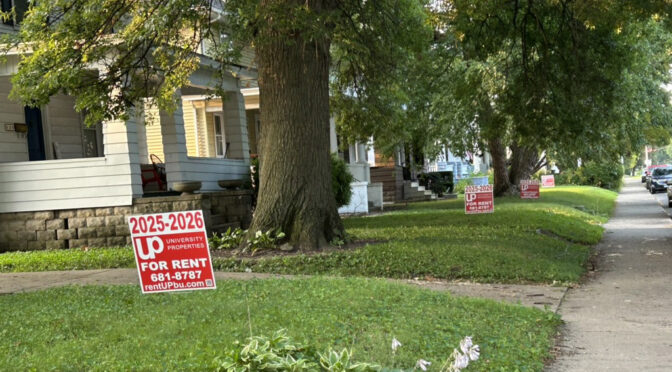The Arbor District is an historic neighborhood in the West Bluff bounded by West Main Street on the north, Western Avenue on the west, Bradley Avenue on the south, and Bradley University on the east. It has had its share of challenges. In the 1980s, the widening of Western Avenue made the housing facing Western less viable due to higher traffic volume, higher speeds, and less buffer between the houses and the street. So the neighbors decided to establish the Western Avenue Greenway Project, which purchased and razed the houses that fronted Western and replaced them with a linear park. Then in 2007, Bradley University wanted to expand their campus for additional parking, so they purchased all the homes along then-Maplewood Avenue (now AJ Robertson Circle and Clarissa Ct.), razed them, and put up a five-story parking garage to the north and a gravel lot used for parking and open-air storage of building materials to the south.
There are now about 116 improved properties left in the Arbor District, but not many are owner-occupied anymore. Bradley University owns six properties in the Arbor District, one of which they recently razed after letting it fall into disrepair. Ideal Rentals owns a few and rents them to Bradley students. But after Bradley’s campus expansion in 2007-8, Perry and Leslie Tate started buying up homes as they came on the market and putting them into land trusts. Today, they own 73 properties (about 63% of the homes), which they rent to Bradley students under their University Properties company. The acquisition cost of the properties is over $8 million.
Rental properties are an important market segment, and there’s nothing wrong with having some rental properties in a neighborhood. But when the rental properties outnumber the owner-occupied homes, and when they are predominantly rented by students who only stay a few months at a time and are constantly changing, you start to lose neighborhood stability. But the bigger issue here is that you have a single owner consolidating properties in a small, defined area. This opens up concerns that the properties are potentially being assembled for another purpose, and that the rental of them is just to bide time until all properties are acquired.
Adding to this suspicion is the fact that the properties are being put into land trusts. Land trusts are essentially non-profit organizations that actually hold the title to the property. It’s a private legal agreement that specifies a grantor (or owner), a grantee (or beneficiary), and a trustee. This means that in property records, you don’t see the name of the owner as specified by the private agreement–you only see the land trust as the owner. The land trust name and the trustee are the only public information available.
What this means is that the actual owner of the property can be changed without any public disclosure. All that has to be done is for the private legal agreement–the trust–to be amended. In public property records, it will still say that the trust owns it, but you’ll never know that the owner specified in the private trust document has changed. This makes it easy to transfer ownership of property with complete anonymity.
And it means that we don’t really know who owns 63% of the Arbor District. Nor will we know if that ownership ever changes hands as long as the trust holds title to it. And that anonymity and uncertainty makes the remaining homeowners in the Arbor District nervous.
Why? Because Bradley University has already expanded their campus into the Arbor District just 16 years ago and would be the most likely entity to want to acquire the rest of the neighborhood for future expansion. I reached out to Bradley and Perry Tate/University Properties and asked if Bradley was part of the trust that holds title to these properties, but received no answer from either organization.
The trustee for the Arbor District properties is William R. Kohlhase. He’s a partner at Miller, Hall & Triggs, LLC, with offices in downtown Peoria. Their published client list includes Bradley University, but not University Properties. That doesn’t prove anything, but it does fuel speculation and neighborhood concern.
I provided all the information I gathered on this issue to the local media, but they haven’t deemed it newsworthy, apparently. In the 1960s, a time when newspaper reporters were more curious, a reporter for The Sentinel Star (now The Orlando Sentinel) in Florida started to notice large tracts of land being purchased by land trusts. Rumors began to swirl over who might be the real owner of the land. Was it a car manufacturer? A space engineering firm?
Eventually, all the clues pointed to a California company: Walt Disney Productions. And on November 15, 1965, Disney made its official announcement that, yes, they were the ones who were the real owners, and that they would be building a new theme park in Florida: Walt Disney World. The reason they had kept their identity a secret was to keep land prices low. If landowners found out Disney was the interested party, they likely would have raised their prices.
It’s not unreasonable to speculate that something similar is happening here, although not as exciting as a Disney theme park coming to town. Who’s the mystery owner of two-thirds of the Arbor District? What plans are in store for it? Why all the secrecy? Why no comment from Bradley University? If you have any information on this, please let me know in the comments below, or email me directly.


 Waldenbooks in Northwoods Mall is closing for good this month.
Waldenbooks in Northwoods Mall is closing for good this month.